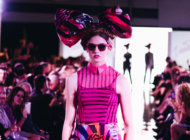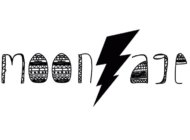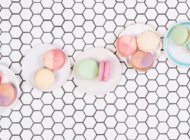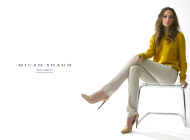The journey from the suburbs of Phoenix to New York fashion week is one that most fashion journalists only dream about. On occasion however, a writer will break away from the desert and wind up in the fashion fast lane.
Corbin Chamberlin is a freelance fashion journalist who writes for several major publications including Financial Times, Business of Fashion, Avenue Magazine, New York Magazine – The Cut, Us Weekly and is a contributing editor at the New York Observer’s Scene Magazine. In addition to everything, Corbin took a job with a national newspaper’s fashion section- he couldn’t go into details at the time.
He got started in the industry at age 17 with a project for Teen Vogue. With his clinical perspective on style and cutthroat criticism, it’s no wonder that Corbin has had major success.
We got the amazing opportunity to sit down and ask Corbin a couple of questions over a cup of French press coffee:
What advice would you give to someone who is looking to break into the fashion industry, specifically fashion journalism?
“Be humble. I think it’s a big turn off for editors when younger people aren’t humble and they pretend like they know anything because you really don’t. You really have no idea what you’re talking about when you’re just starting off. No matter how often you check into Style.com”
“It’s good to know your place. Ask questions at the right time and observe. 80% of what you learn is just from watching and observing and sparing editors stupid questions.”
Corbin stressed that being humble is key in this industry. There are countless others that have devoted an endless amount of time to learning the ins and outs of the fashion world. He advises newbies to observe, observe, observe.
“Be enthusiastic. I think there’s really nothing worse than when I take an intern on or an assistant and they aren’t excited. You know we’re working in fashion…it’s exciting.”
A positive attitude is essential in any work situation, but Corbin couldn’t have said it better when he reminds us that fashion is fun! Take your job – not yourself – seriously.
“You have to develop a tough skin, that’s very important to know in fashion. There are a lot of people who don’t have time to be nice and it’s not that they don’t want to be nice to you; it’s just very demanding and their schedules don’t permit politeness”
Don’t take it personal. Life in fast lane fashion is demanding and requires clear, concise conversation.
Who have been your professional mentors and why?
“There have been three people I have worked with that I absolutely worship. Peter Davis, my Editor-in-Chief at Scene Magazine, Peter taught me the importance of enthusiasm and to always play nice. Amina Akhtar, now Executive Editor at Elle.com, is perhaps the hardest working person in the industry and is insanely smart. Vanessa Friedman, fashion editor at the Financial Times, she without question is one of the greatest minds in fashion- there’s no words to describe her genius.”
What’s your favorite part of working in the fashion industry?
“The observation of young talent is very important to me and it’s very important to the publications I work for. I think it’s great cause I’ll go to shows at Parsons, shows at Pratt and a few years later I’ll see them at Lincoln Center and it’s really rewarding to me. And I love to see older designers grow and expand… For me it’s about the observation.”
“Fashion’s a thrilling place to work; it’s constant change doesn’t consist of dull-days. You shouldn’t be bored. It’s like that old saying, ‘If you leave hungry, it’s your own fault’, so if you leave bored, it’s your own fault. Certainly”
Young and old alike, there’s always room for growth in this ever-changing industry. Corbin references back to the importance of observation and learning from others, even in his daily life.
How did you get into big city, New York fashion coming from Phoenix? Do you have any advice for someone looking to do the same?
“It was a challenge for me. The key is to outreach to the correct right person; know their work, throughly understand the publication they work for and then beg for a brief moment of their time to meet. Most importantly, do not outreach to someone for work, if you don’t posses the skill. Be honest with yourself, then improve”
“If someone wants to make the transition from Phoenix to New York it’s most important that they have the education and the knowledge and that their skills are super sharpened.”
“You have to work to work —You really have to know what you want to do—You really need to research the post you want.”
Knowledge is power. Know all you can before you contact the individuals that can impact your career. There are no second chances at first impressions. By having a specific job in mind, you can begin your research and decide what skills are necessary to develop and who you can begin to network with.
Do you have future plans for your career?
“I’m working with a new amazing publication. As for a future permanent post? My past seems to be encouraging a future job as a fashion news editor- but, we’ll see”
“Remember, you’re always a student of fashion. If you stop learning you die (professionally). You can never be above the industry; you can never learn too much. Fashion is this ecosystem that’s constantly changing, and if you turn away from it for a second you’re done.”
Although Corbin isn’t positive of his next moves, we are certain he will be successful. With an amazing repertoire of writing on his resume, this name isn’t disappearing from fashion any time soon.
To find out what Corbin Chamberlin has up his sleeve next, like him on Facebook: http://www.facebook.com/corbinBChamberlin and follow him on Twitter: @Corbin_C
























